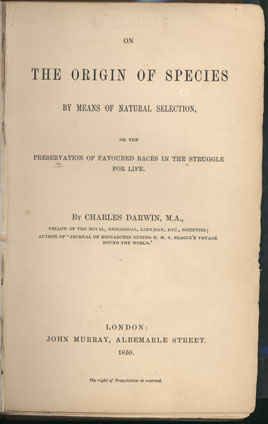
|
 |
|
Last Updated: 2, Apr 2018 - 10:02 |
What did Darwin ever do for us? If he hadn’t voyaged on the Beagle and had become a clergyman instead would the world be different today? I doubt it.

On the Origin of Species by Means of Natural Selection or The Preservation of Favoured Races in the Struggle for Life
|
If Darwin hadn’t published his ‘Origin of the Species’ on this day 150 years ago someone else would have produced something very similar. Even as it stands he was almost pipped at the post by a younger scientist named Wallace who sent him a manuscript outlining the bones of an evolutionary theory that was uncannily similar to his – so much so that they ended up published a joint paper on the topic – saving Darwin some embarrassment.
What did Darwin and Wallace say about evolution? Their basic idea was that if an organism lives to reproduce then its characteristics will be passed on to the next generation. Those species that live long enough to have offspring will tend to survive better than those that don’t live long enough to reproduce. It’s simple and obvious.
Bear in mind that Darwin did not know anything about DNA or genetics. But he did observe that within any particular species there was typically a wide range of variation in characteristics – hair colour, beak shape, feathers, height, nose and eye shape, fruit colour, leaf shape and so on. These can vary quite a bit even within a given animal or plant species. Nowadays we understand why such variation occurs and the underlying mechanisms causing such variation. Darwin was one of the first to document variations within species in great detail. His work on the Galapagos finches in particular showing the range of characteristics – beaks, wings, feeding habits, etc., is probably seminal in stimulating his thinking on how new species originate - the idea of 'natural selection'.
Today we understand the underlying mechanism of natural selection – genetic changes in DNA that allow in rare cases ‘improvements’ in fitness to occur. Most genetic changes – mutations – are not helpful in survival but occasionally a change does allow an individual to have more offspring. This may happen in conjunction with environmental change – a gene that prevents cells freezing may be expected to benefit when temperatures drop for example. Modern animal and plant breeding speeds up such changes. In genetically modified organisms (GMOs) we can even deliberately insert genes for particular characteristics artificially – herbicide resistance in crops for example. The mechanisms are clearly understood in other words.
In nature, however, such changes take place over thousands of generations slowly and imperceptibly most of the time - although perhaps also with occasional periods of more rapid change in the face of rapid environmental changes. With our short life-span though we are not equipped to get our heads around the sheer length of time needed to produce a new species by the slow process of evolution. That is not to say that it does not occur of course. It's difficult to get your head around quantum mechanics too but it doesn't stop us using mobile phones or other electronic items that are based on principles of quantum mechanics.
The kind of basic genetic mutation that can occur over a long number of generations was shown recently in a laboratory experiment that has now been running for more than 20 years. A simple bacterial culture, starting with a single E. coli, was grown in a solution over thousands of generations. After 31,500 generations the bacteria, E. coli, acquired a mutation that allowed it to use the citrate as a food source. The citrate was present in the medium in which the bacteria were grown. Normal bacteria cannot use citrate as a food source, preferring glucose. The nice thing about this experiment is that the scientists running it kept frozen samples of the populations and were able to go back and retrace their steps and pin down the mutations that led to this major beneficial advance in its ability to survive.
The span of 31,500 generations is equivalent to something approaching million years assuming an average 30-year human generation; so such an important change that is beneficial to survival can indeed take a long time for a long-lived species such as Homo sapiens.
Another recent paper has a fascinating suggestion that speech in humans versus lack of speech in chimpanzees is attributable to a very simple genetic difference between man and chimp. We share something like 99% of the same genes with chimps in any case - but each gene has a range of variants. In this case a simple variation in a genetic ‘switch’ triggers, in the case of humans, a whole cascade of subtle changes in nerve development, for example. This seems to be critically important in wiring up our brain so that we have the power of speech. Both chimps and human share the same basic gene (it’s called FOXP2) but our version has a slightly different form and the switch version is lacking in chimpanzees. We are separated from chimps in the dim distant past something like 6 million years back – long enough to produce the mutation that allows us to speak while they just babble and screech.
Darwin would be in his element if he were still with us today. His basic understanding of natural selection has been steadily reinforced by scientific advances over the 150 years since the publication of 'On the Origin of Species by Means of Natural Selection or The Preservation of Favoured Races in the Struggle for Life' to give it its full title.
|
© Copyright 2009 by © Contributor(s) and Castlebar Web Pages 1997 - 2018
..
Top of Page
|
|
 |

|